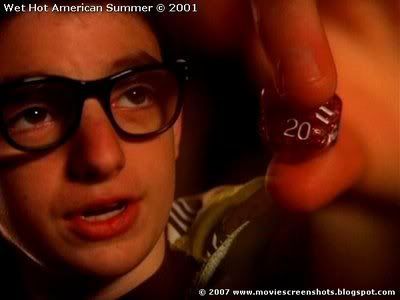As a new DM, I also didn't think I wanted to "do voices" or play in character. The example descriptions of gameplay from the sourcebooks, in which example players communicate as though they are they characters always gave me horrible flashbacks to grade school fieldtrips taken to see condescending children's theater. These example players were entirely too enthusiastic to be believed. I mean, nobody talks like they talk!
Despite my intent to play things cool. "Yeah, you see a dragon... it's like, sup? I'mma eat you now." I soon found myself getting into the characters I had created, playing them up. I actually enjoy acting... enough to have a degree in it, so when presenting an interesting character, I instinctively start to slip into their character. However, in my opinion* D&D is not a play. It's not even an improvised play. I think the hackneyed examples of gameplay in the sourcebooks present it too much like it is.
For me, D&D is partially improvised, participatory storytelling. It is a mix of dialogue like you would find in a theater performance, intermingled with narration like you would find in a book. While the skills of a good storyteller are very similar to those of an actor, a storyteller must be simultaneously in and out of character. For example, my 5th grade teacher was one of the best storytellers I've known. She read Brian Jacques' book, Redwall to our class, getting completely into the telling. She had distinct deliveries for all of the different types of animals, from the mice, to the earthy speech of the moles, to the frantic chatter of Warbeak, the bird and the sinister hiss of Asmodeus the snake. However, despite playing up these characters, she maintained a slightly heightened version of her normal persona while reading the narration. This balance between being a distinct character and being a storyteller describing a scene from outside the story is the balance that I began to find in my DMing.
 |
| So then, I poked the beholder in the eyeball, just. like. THIS! |
Now, my players are not largely the sort to slip into character. Don't get me wrong, they get into the game. My fiance has been threatening to have her sorceress go postal ever since cultists kidnapped her in-game boyfriend. My players, however, tend to refer to their characters mostly in third person. They do not "do voices". This level of buy-in is perfectly fine. We are a beer-and-pretzels sort of casual group. I can tell they are into the game even if they are not in character.
I have also noticed, however, that they seem to enjoy themselves the most when I am playing up the characters... like a storyteller. When I get into this mode, I start to play on my feet. I occasionally slip into accents, but more often simply play each NPC's intent and emotional state. Listening to my players and trying to react according to what they say and do. When I do this, I notice my players lean forward, put their cellphones down, react more quickly and, on occasion, will slip a little further into their characters than they might have been comfortable with when we first started playing three years ago.
*Anyone telling you they know the proper way to play D&D is either a generation warrior, a pompous ass, or both. The game can be played an infinite number of ways depending on the dynamic of the group.


I LOVE it when you get into storyteller mode! It really gets our heads into the game. Also, you're freaking ENTERTAINING! It's much more interesting to hear you ramble on in a gruff salty barman's voice about the "mysterious disturbances" in the area than for you to say "Barman Jim says there are ghouls eating peoples' cows. You should go kill them." It definitely motivates me to act more "in character" and think "what would my character do in this situation" :)
ReplyDelete